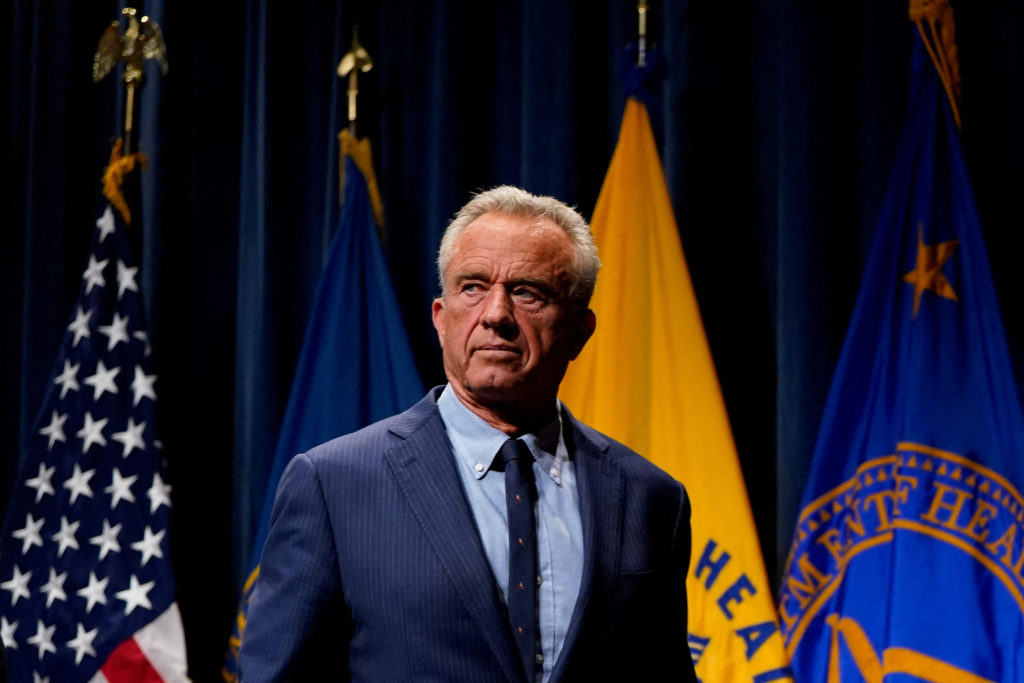
FILE PHOTO: U.S. Health and Human Services (HHS) Secretary Robert F. Kennedy, Jr. leaves the stage after discussing the findings of the Centers for Disease Control and Prevention’s (CDC) latest Autism and Developmental Disabilities Monitoring (ADDM) Network survey, at the Department of Health and Human Services in Washington, D.C., U.S., April 16, 2025. REUTERS/Elizabeth Frantz/File Photo
NEW YORK – In a bold move, U.S. Health Secretary Robert F. Kennedy Jr. has appointed eight new advisers to the vaccine policy panel, replacing the previously dismissed group.
Breaking: New Vaccine Panel Announced
On Wednesday, Kennedy introduced eight new members to the Advisory Committee on Immunization Practices (ACIP), a decision that has sparked widespread debate among health professionals. The newly appointed members include figures known for their critical stance on COVID-19 vaccines and pandemic measures.
Immediate Impact
The decision to overhaul the panel comes after Kennedy abruptly dismissed the previous 17-member committee earlier this week. This move has been met with criticism from medical groups and public health organizations concerned about the potential shift in vaccine policy direction.
Key Details Emerge
Among the new appointees is Dr. Robert Malone, a former mRNA researcher who gained notoriety for his controversial views on COVID-19 vaccines. Malone has been a vocal critic, promoting alternative treatments and questioning vaccine safety.
Dr. Malone has claimed that millions of Americans were hypnotized into taking COVID-19 vaccines.
Another notable appointee is Dr. Martin Kulldorff, co-author of the Great Barrington Declaration, which argued against pandemic lockdowns. The panel also includes Vicky Pebsworth, associated with the National Vaccine Information Center, a group often criticized for spreading vaccine misinformation.
Industry Response
The response from the medical community has been swift. Many experts worry that the new panel may align more closely with Kennedy’s skepticism towards established vaccination protocols. The American Academy of Pediatrics and other organizations have expressed concern over the potential influence of the new members on vaccine recommendations.
By the Numbers
The previous ACIP panel consisted of 17 members.
The new panel includes 8 members, with a potential for more appointments.
What Comes Next
The new panel is expected to convene before the next scheduled meeting in late June, where they will discuss vaccinations for flu, COVID-19, HPV, RSV, and meningococcal bacteria. The agenda for this meeting has not yet been posted, but the impact of the new members will be closely watched.
Background Context
The ACIP, established in 1964, plays a crucial role in advising the Centers for Disease Control and Prevention (CDC) on vaccine use. Traditionally, the CDC directors approve the panel’s recommendations, which guide national vaccination programs.
Kennedy’s appointment as Health Secretary was confirmed by the U.S. Senate in February, despite his history as a leading voice in the anti-vaccine movement. His recent actions suggest a potential shift in U.S. vaccine policy.
Expert Analysis
Jason Schwartz, a health policy researcher at Yale University, highlighted the challenges of excluding experts with industry ties, noting that collaboration with vaccine manufacturers is often part of research.
“If you exclude any reputable expert who has engaged with the vaccine industry, you limit the pool of knowledgeable candidates,” Schwartz stated.
Regional Implications
The changes to the ACIP could have significant implications for vaccination policies across the United States, affecting how vaccines are recommended and administered. The upcoming meeting will be a critical moment in determining the panel’s direction under Kennedy’s leadership.
As the new panel prepares to meet, the medical community and public health officials will be watching closely to see how these changes influence national vaccination strategies.





